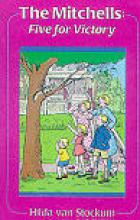History World War II
Behind Enemy Lines
A Young Pilot's Story
Subject(s):
Grade / Age level:
Review:
This is a fascinating personal account of a U.S. Air Force pilot who was shot down over Holland and spent the rest of World War II in a POW camp in Germany. He wrote it specifically to honor the Dutch who took care of him at great peril to their own lives.
It was a particularly interesting read after being acquainted with Hilda Van Stockum's The Winged Watchman as locations and situations are very similar.
The narrative is simple and understated (and very REAL), but you can imagine the voice of a grandfather sharing his adventures and impressions with the young people of today. The epilogue is particularly fascinating and makes it even more clear why the author wanted to write down his story for others.
Violence and a few choice words make this most appropriate for seventh grade and up. It is a particularly fast read (extra-wide spacing also helps!) making it a good choice for older reluctant readers.
Reviewed by:
First reviewed:
2-26-2008
The Mitchells: Five for Victory
Subject(s):
Grade / Age level:
Review:
This is a charming and thoughtful story of an American family of five children during World War II (based on Hilda Van Stockum's own family) whose father is away at war. The family is very real with plenty of worries and troubles...but they manage to find joy with each other. For independent reading, it could be one your children's first full-length chapter books.Wit and wisdom make it a can't miss for adults as well (a perfect read-aloud). This has been a favorite with our family (for children as young as four or five) for many years.
Washington D.C. is an exciting place to grow up and the children are enchanted with pets, clubs and a mysterious girl who has just moved in down the street. Mother's attempts to take in boarders and a visit from Uncle Jim and "Mr. Jenkins" keep them busy while Father is away. Pets and babies are particularly memorable characters.
There is an aspect of the story that might be troubling for young children sensitive about adoption. A neighbor who considers adopting a war refugee decides not to because the child doesn't get along with the lady's son. The fate of adopted children is discussed rather carelessly by this lady (in terms of "well, my son has to come first") and the mother of the Mitchells doesn't have any good comebacks to resolve the issue. The story resolves nicely, however, as the girl ends up finding her grandfather, but this segment might need a little explanation. My sister-in-law (who has two adopted children) found the issue troubling and put the book aside until her children were older.
Washington D.C. is an exciting place to grow up and the children are enchanted with pets, clubs and a mysterious girl who has just moved in down the street. Mother's attempts to take in boarders and a visit from Uncle Jim and "Mr. Jenkins" keep them busy while Father is away. Pets and babies are particularly memorable characters.
There is an aspect of the story that might be troubling for young children sensitive about adoption. A neighbor who considers adopting a war refugee decides not to because the child doesn't get along with the lady's son. The fate of adopted children is discussed rather carelessly by this lady (in terms of "well, my son has to come first") and the mother of the Mitchells doesn't have any good comebacks to resolve the issue. The story resolves nicely, however, as the girl ends up finding her grandfather, but this segment might need a little explanation. My sister-in-law (who has two adopted children) found the issue troubling and put the book aside until her children were older.
Perspective:
Catholic
Reviewed by:
First reviewed:
12-12-05


